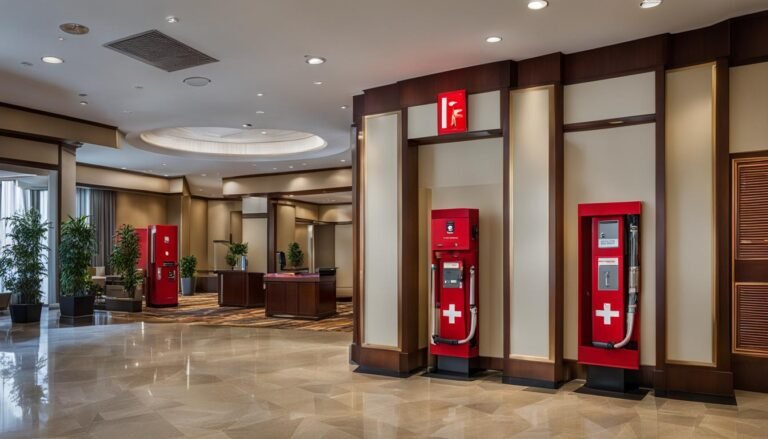Essential Guide: Handling Hazardous Materials Safely in Hospitality Settings
The hospitality industry plays a vital role in providing exceptional service and unforgettable experiences. However, with the increased emphasis on cleanliness and hygiene in the wake of the pandemic, the industry must also prioritize the safe handling of hazardous materials. From alcohol-based sanitizers to bleach and degreasers, these substances are commonly used in the hospitality sector but can pose serious risks to the health and well-being of staff if not handled properly.
In this comprehensive guide, we will explore the importance of safety protocols in handling hazardous materials safely within hospitality settings. We will discuss the types of hazardous cleaning substances used in the industry, the safeguarding of hospitality staff, storage and handling guidelines, personal protective equipment (PPE), decontamination facilities, risk assessment, compliance with safety regulations, and the significance of continuous improvement and training. By following these best practices, the industry can create a safe working environment and protect its workforce.
Key Takeaways:
- Proper storage and handling of hazardous materials is crucial in the hospitality industry to protect staff and comply with safety regulations.
- Common hazardous cleaning substances used in hospitality settings include alcohol-based sanitizers, bleach, degreasers, and oven cleaners.
- Safeguarding hospitality staff involves providing proper training, personal protective equipment (PPE), and decontamination facilities.
- Storage guidelines should be followed, and appropriate labeling and signage should be used to ensure easy identification of hazardous substances.
- Continuous improvement and training programs help enhance safety practices and keep up with evolving industry standards.
Types of Hazardous Cleaning Substances Used in the Hospitality Industry
The hospitality industry relies on various hazardous cleaning substances to maintain cleanliness. These include alcohol-based sanitizers, bleach, chlorine, degreasers, and oven cleaners.
Alcohol-based sanitizers are commonly used for hand hygiene, but they are highly flammable and can cause skin irritation and eye injuries.
Bleach, a powerful disinfectant, is commonly used for bathroom and kitchen cleaning. However, it can cause skin and eye irritation, and inhaling bleach fumes can damage the lungs.
“Bleach can be toxic if consumed or inhaled in high concentrations.”
Chlorine is another chemical used for disinfection, particularly in swimming pools. It is important to note that chlorine can release toxic chlorine gas if it reacts with a smaller amount of water.
Degreasers are used in kitchens to cut through fats and oils. These substances are highly alkaline and can cause damage to the lungs, skin, and eyes.
Oven cleaners contain chemicals that can cause significant damage to the skin, eyes, and release dangerous fumes.
| Hazardous Cleaning Substances | Hazards |
|---|---|
| Alcohol-based sanitizers | Highly flammable, skin irritation, eye injuries |
| Bleach | Skin and eye irritation, inhalation of bleach fumes can damage the lungs |
| Chlorine | Release of toxic chlorine gas if reacted with water |
| Degreasers | Damage to the lungs, skin, and eyes |
| Oven cleaners | Significant skin and eye damage, release of dangerous fumes |
It is important for hospitality staff to be aware of the hazards associated with these substances and take necessary precautions to ensure their safety.
Importance of Safeguarding Hospitality Staff
Safeguarding hospitality staff is of utmost importance when it comes to handling hazardous materials in the industry. By implementing proper storage and handling procedures, providing personal protective equipment (PPE), and ensuring the availability of decontamination facilities, employers can prioritize the safety and well-being of their employees. This not only protects them from potential dangers but also ensures compliance with workplace safety regulations.
Proper storage and handling are crucial aspects of safeguarding hospitality staff. Sturdy and undamaged shelving should be used to store hazardous substances, and storage rooms should be well-lit and ventilated. Clear organization, signage, and labeling are essential for easy identification of substances. Employees should be educated on proper handling techniques, associated hazards, and spill response procedures to minimize risks.
Personal protective equipment (PPE) plays a vital role in safeguarding hospitality staff. Rubber gloves, safety glasses, and face masks should be provided based on the specific hazards of the substances being handled. PPE should be used in accordance with workplace safety regulations to protect against skin irritation, eye injuries, respiratory issues, and chemical burns. By wearing appropriate PPE, employees can minimize the risk of potential injuries or illnesses.
Having decontamination facilities readily available is essential in the event of a chemical spill or contact with hazardous substances. Eye/face wash units and safety showers should be located within reach of hazards to ensure quick and effective decontamination. These facilities aid in minimizing the harm caused by hazardous substances and enable swift response during emergencies.
Table: Recommended Safeguarding Measures
| Safeguarding Measures | Description |
|---|---|
| Proper storage and handling | Use sturdy and undamaged shelving, well-lit and ventilated storage rooms, clear organization, signage, and labeling |
| Employee education | Educate employees on proper handling techniques, associated hazards, and spill response procedures |
| Personal protective equipment (PPE) | Provide rubber gloves, safety glasses, and face masks based on the specific hazards of the substances being handled |
| Decontamination facilities | Ensure the availability of eye/face wash units and safety showers within reach of hazards |
Storage and Handling of Hazardous Substances
Proper storage and handling of hazardous substances in the hospitality industry is crucial for the safety of employees and compliance with workplace regulations. Adhering to storage guidelines and implementing effective chemical storage solutions can greatly reduce the risk of accidents and injuries in the workplace.
Hazardous Substance Storage Guidelines
When storing hazardous substances, it is important to follow specific guidelines to ensure their safekeeping. These guidelines include:
- Using suitable containers that are in good condition and properly closed to prevent leaks or spills.
- Storing containers on sturdy and secure shelving units to minimize the risk of accidents.
- Keeping storage areas well-lit and properly ventilated to maintain a safe environment.
- Using clear signage and labeling to clearly identify hazardous substances and prevent confusion.
By following these storage guidelines, hospitality establishments can minimize the potential dangers associated with hazardous substances and create a safer working environment for employees.
Chemical Storage Solutions
Implementing appropriate chemical storage solutions is essential for the effective management of hazardous substances in the hospitality industry. These solutions may include:
- Separate storage areas for different types of hazardous substances to prevent incompatible chemicals from accidentally mixing.
- The use of spill containment systems, such as containment pallets or spill trays, to contain any spills or leaks and prevent them from spreading.
- The installation of chemical storage cabinets that are specifically designed to safely store hazardous substances, providing additional protection.
By utilizing these chemical storage solutions, hospitality businesses can minimize the risk of accidents, protect their employees, and ensure compliance with safety regulations.
| Storage Guidelines | Chemical Storage Solutions |
|---|---|
| Use suitable containers in good condition and properly closed. | Separate storage areas for different types of hazardous substances. |
| Store containers on sturdy and secure shelving units. | Utilize spill containment systems to contain spills or leaks. |
| Keep storage areas well-lit and properly ventilated. | Install chemical storage cabinets for added protection. |
| Use clear signage and labeling to identify hazardous substances. |
Importance of Personal Protective Equipment (PPE)
In the hospitality industry, handling hazardous substances safely requires the use of personal protective equipment (PPE). PPE plays a crucial role in protecting employees from potential risks and ensuring workplace safety. When working with hazardous substances, employees should wear appropriate PPE based on the specific hazards they may encounter.
Some examples of PPE include:
- Rubber gloves: These protect against corrosive substances that may cause skin irritation or burns.
- Safety glasses: They prevent eye injuries from splashes or airborne particles.
- Face masks: These protect against inhalation of toxic fumes or airborne contaminants.
By providing and encouraging the use of proper PPE, employers can significantly reduce the risk of injuries or illnesses associated with hazardous substances in the workplace.
“Personal protective equipment is the first line of defense against workplace hazards. It is essential for employees to use the appropriate PPE to protect themselves from potential risks.”
It is important to note that the use of PPE should comply with workplace safety regulations. Employers should provide training to employees on the proper use and maintenance of PPE. Regular inspections and replacements of PPE should be conducted to ensure its effectiveness. By prioritizing the use of PPE, employers demonstrate their commitment to employee safety and create a culture of workplace safety.
Decontamination Facilities for Hazardous Substances
The availability of decontamination facilities is crucial in the event of a chemical spill or contact with hazardous substances. These facilities serve a vital role in providing immediate response and minimizing potential harm. Two important decontamination facilities to consider are eye/face wash units and safety showers.
The eye/face wash units are specifically designed to protect against eye injuries caused by chemical splashes. They should be strategically placed in areas where there is a high risk of exposure to hazardous substances. In the event of an accident, employees can quickly access these units to rinse their eyes and face, helping to minimize the potential damage.
Safety showers, on the other hand, are essential for full-body decontamination. They are typically used in larger spills or incidents where the entire body may be exposed to hazardous substances. Safety showers are designed to deliver a rapid flow of water over the affected areas, aiding in the removal of contaminants and reducing the risk of further harm.
Benefits of Decontamination Facilities:
- Provide immediate response in case of chemical spills or contact with hazardous substances
- Minimize potential harm and damage to employees
- Protect against eye injuries with strategically placed eye/face wash units
- Ensure full-body decontamination with safety showers
Having these decontamination facilities readily available within the workplace is essential for maintaining a safe environment. They enable quick and effective response to emergencies involving hazardous substances, reducing the potential risks and ensuring the well-being of employees.
| Eye/Face Wash Units | Safety Showers | |
|---|---|---|
| Function | Provide immediate rinsing of eyes and face | Enable full-body decontamination |
| Placement | Strategically placed in areas with a high risk of exposure | Available in designated areas throughout the workplace |
| Usage | Used for eye injuries caused by chemical splashes | Appropriate for larger spills or incidents involving full-body exposure |
Risk Assessment for Hazardous Chemicals
When working with hazardous chemicals in the hospitality industry, conducting a thorough risk assessment is essential to ensure workplace safety and mitigate risks. A risk assessment helps identify potential hazards, evaluate the level of risk, and implement measures to minimize those risks. By assessing the type of chemicals used, their properties, and associated hazards, employers can develop appropriate storage, handling, and spill response procedures.
During a risk assessment, it is important to consider various factors such as the quantity of hazardous chemicals present, the frequency of their use, and potential exposure scenarios. This assessment should also take into account the specific tasks and activities that employees engage in, as well as potential accident or spill scenarios that may occur.
By thoroughly assessing the risks associated with hazardous chemicals, employers can implement effective control measures to minimize the likelihood of accidents or injuries. Regularly reviewing and updating risk assessments is crucial to ensure that safety procedures remain relevant and effective in a constantly evolving working environment.
Table: Hazardous Chemicals Risk Assessment
| Hazardous Chemical | Potential Hazards | Control Measures |
|---|---|---|
| Alcohol-based sanitizers | Flammability, skin irritation, eye injuries | Store in a well-ventilated area away from open flames, provide appropriate PPE |
| Bleach | Skin and eye irritation, lung damage from inhalation | Follow proper dilution ratios, ensure adequate ventilation, provide PPE |
| Chlorine | Release of toxic chlorine gas if exposed to water | Handle and store with caution, use appropriate PPE, ensure proper ventilation |
| Degreasers | Damage to lungs, skin, and eyes | Follow handling instructions, use adequate ventilation, provide PPE |
| Oven cleaners | Skin and eye damage, release of dangerous fumes | Handle with care, use appropriate PPE, ensure good ventilation |
By following a comprehensive risk assessment process and implementing appropriate control measures, employers can ensure the safe handling and management of hazardous chemicals in the hospitality industry. Continual monitoring and evaluation of safety procedures are essential to maintain a secure working environment and protect the wellbeing of employees.
Compliance with Safety Regulations
In the hospitality industry, compliance with safety regulations is of utmost importance to ensure workplace safety and effective hazardous substance management. Employers must adhere to the regulations set forth by relevant authorities to prevent workplace accidents, injuries, and potential legal repercussions. By complying with safety regulations, employers create a secure working environment for their employees and promote regulatory compliance within the industry.
Safety regulations encompass a wide range of aspects related to the management of hazardous substances in the hospitality industry. These regulations dictate proper storage and handling procedures, the provision of appropriate personal protective equipment (PPE), risk assessment protocols, and the availability of decontamination facilities. Employers must stay informed about the specific safety regulations applicable to their operations and take proactive measures to ensure full compliance.
Regulatory Compliance Checklist
To achieve compliance with safety regulations, employers can follow this checklist:
- Understand the relevant safety regulations governing hazardous substance management in the hospitality industry.
- Implement proper storage and handling procedures for hazardous substances, ensuring compliance with storage guidelines and labeling requirements.
- Provide employees with the necessary personal protective equipment (PPE) based on the specific hazards associated with the substances they handle.
- Conduct thorough risk assessments to identify potential hazards, evaluate risks, and implement measures to mitigate those risks.
- Maintain decontamination facilities, such as eye/face wash units and safety showers, within easy reach of hazardous areas.
- Regularly review and update safety procedures to incorporate new knowledge and technologies, ensuring continuous improvement.
By following this checklist and other relevant guidelines, employers can demonstrate their commitment to workplace safety, protect their workforce, and maintain compliance with safety regulations in the hospitality industry.
References:
“Hospitality Regulations and Compliance.” HospitalityLawyer.com. Accessed November 20, 2023. https://www.hospitalitylawyer.com/regulations/
“Compliance with Occupational Safety and Health Standards.” U.S. Department of Labor. Accessed November 20, 2023. https://www.osha.gov/compliance
Expert Advice and Assistance
Seeking Expert Guidance for Workplace Safety
Handling hazardous materials safely in the hospitality industry requires expert advice and assistance. Employers are encouraged to provide hazardous material training to their employees to ensure they are well-informed about potential hazards and proper handling procedures. Training programs should cover topics such as the identification of hazardous substances, storage guidelines, and emergency response protocols. By investing in comprehensive training, employers can empower their staff to handle hazardous materials safely and effectively.
Compliance with Workplace Safety Regulations
Staying compliant with workplace safety regulations is crucial for the hospitality industry. Employers should seek expert advice to ensure they are up to date with the latest regulations and requirements. This includes understanding chemical storage guidelines, proper handling techniques, and the use of appropriate personal protective equipment (PPE). Consulting with a chemical storage specialist or an occupational health and safety professional can provide valuable insights and guidance to ensure full compliance with workplace safety regulations.
Implementing Best Practices
Expert advice can help employers implement best practices for hazardous material management. These best practices may include establishing proper storage and handling procedures, conducting regular risk assessments, and maintaining decontamination facilities. By following expert guidance, employers can create a culture of safety and ensure the highest level of protection for their employees.
| Expert Advice and Assistance | Benefits |
|---|---|
| Access to specialized knowledge | Ensures safe handling and storage of hazardous materials |
| Compliance with workplace safety regulations | Prevents legal repercussions and potential fines |
| Enhanced employee training and awareness | Reduces the risk of accidents and injuries |
| Implementation of best practices | Mitigates risks and ensures a safe working environment |
Overall, seeking expert advice and assistance is essential for handling hazardous materials safely in the hospitality industry. It enables employers to stay compliant with workplace safety regulations, implement best practices, and provide the necessary training and support to their employees. By prioritizing expert guidance, employers can ensure the highest level of safety and protection in the workplace.
Importance of Continuous Improvement and Training
Continuous improvement and training are vital components of maintaining workplace safety and effective hazardous material management in the hospitality industry. By prioritizing ongoing learning and development, employers can ensure that their employees are equipped with the necessary knowledge and skills to handle hazardous materials safely in a constantly evolving industry.
Continuous improvement involves regularly reviewing and updating safety procedures, storage systems, and risk management strategies. This enables employers to incorporate new knowledge, technologies, and best practices into their operations, thereby enhancing the overall safety culture in the workplace.
Training programs play a key role in equipping employees with the necessary competencies to identify hazards, follow safety protocols, and respond effectively to emergencies. By providing comprehensive and regular training, employers can ensure that their staff has the confidence and ability to handle hazardous materials in a manner that minimizes risks to themselves, their colleagues, and the environment.
Investing in continuous improvement and training not only enhances workplace safety but also demonstrates a commitment to employee well-being and compliance with regulatory requirements. By fostering a culture of continuous learning and improvement, employers can create a safer and more resilient environment where the risks associated with hazardous materials are effectively managed.
Benefits of Continuous Improvement and Training
- Enhanced Hazard Recognition and Mitigation: Continuous improvement and training enable employees to develop a heightened awareness of potential hazards and the ability to take proactive measures to mitigate these risks.
- Improved Emergency Response: Regular training ensures that employees are prepared to respond swiftly and effectively in the event of an incident involving hazardous materials, minimizing the potential damage and ensuring the safety of all personnel.
- Compliance with Regulations: Ongoing training ensures that employees are up to date with the latest safety regulations and guidelines, reducing the risk of non-compliance and the associated penalties.
- Increased Efficiency and Productivity: Continuous improvement initiatives can identify opportunities to streamline processes and enhance efficiency, ultimately boosting productivity and reducing costs.
- Employee Empowerment: By investing in their development, employers empower their employees to take ownership of their safety and well-being, fostering a positive and proactive safety culture.
Continuously improving workplace safety through training and development is an ongoing process that requires a commitment from both employers and employees. By embracing this culture of continuous improvement, the hospitality industry can ensure the effective management of hazardous materials and the well-being of its workforce.
Conclusion
In conclusion, handling hazardous materials safely in the hospitality industry is crucial for workplace safety and compliance. By implementing proper storage and handling procedures, providing appropriate personal protective equipment (PPE), conducting thorough risk assessments, and maintaining decontamination facilities, employers can mitigate risks and create a secure working environment for their staff.
Continuous improvement and training are also essential in ensuring the safe handling of hazardous substances. Regularly reviewing and updating safety procedures, storage systems, and risk management strategies, as well as providing ongoing training programs to employees, will enhance their understanding of safety protocols and strengthen their ability to identify hazards and respond to emergencies.
By prioritizing safety and compliance, the hospitality industry can protect its workforce and provide a secure environment for employees and customers alike. Handling hazardous materials safely is essential not only for the well-being of employees but also to prevent workplace accidents, injuries, and potential legal repercussions. With a commitment to workplace safety and hazardous substance management, the industry can thrive while ensuring the highest level of safety and compliance.







